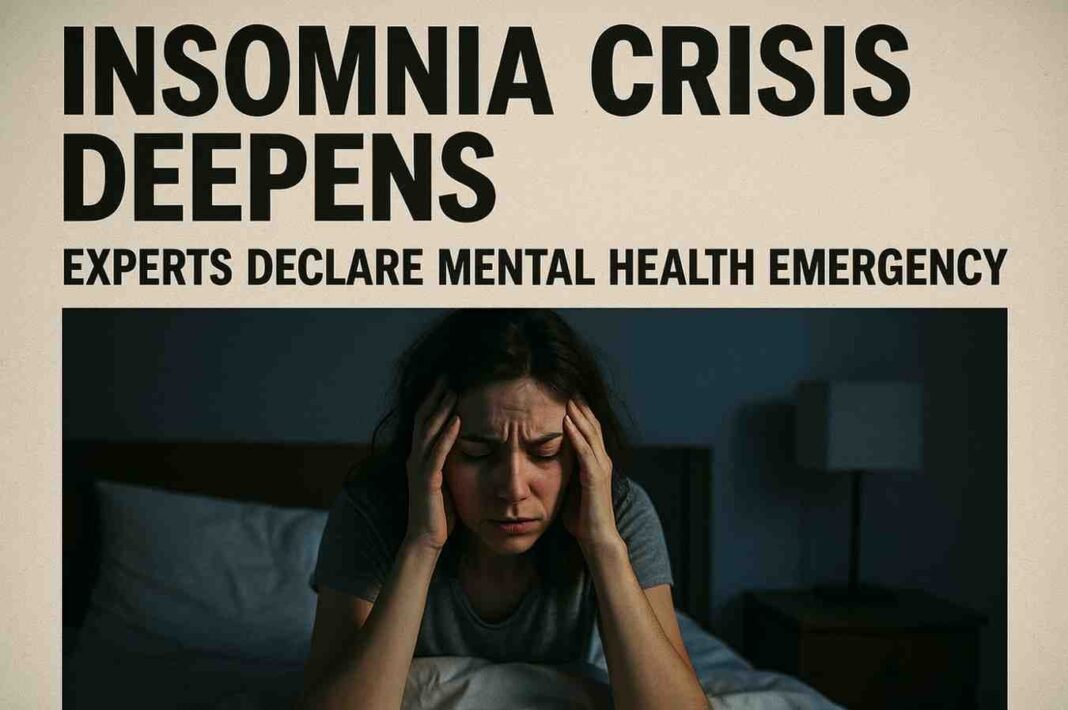Insomnia: The Growing Mental Health Emergency
Insomnia, once dismissed as a minor inconvenience, is rapidly emerging as one of the most pressing mental health challenges of modern life. Experts warn that chronic sleeplessness has reached alarming levels, particularly in India, prompting them to label it a “mental health emergency.” The inability to fall asleep or maintain restful sleep is taking a toll on millions, contributing not only to fatigue and low productivity but also to severe psychological and physical consequences.
Doctors explain that chronic insomnia—defined as the persistent difficulty in sleeping well for at least three nights a week over several months—can lead to anxiety, depression, cardiovascular problems, and impaired cognitive function. The condition has evolved into what experts describe as a “silent epidemic,” fuelled by hectic lifestyles, erratic work hours, unhealthy diets, and rising stress levels.
India’s Sleepless Generation: A Rising Concern
India is witnessing a troubling increase in sleep-related disorders among both adults and teenagers. According to the Centers for Disease Control and Prevention (CDC), nearly three out of four adults below 40 years of age and eight out of ten teenagers are not getting sufficient rest. Data suggests that about 25 percent of adults suffer from chronic sleep disorders such as insomnia or sleep apnea, both of which are linked to serious mental health conditions.
Studies further reveal that individuals with insomnia are ten times more likely to experience depression and seventeen times more likely to develop anxiety compared to those who sleep well. Sleep apnea, another common sleep disorder, also raises the risk of emotional instability, irritability, and reduced ability to manage stress. The lack of quality rest disrupts hormonal balance, impairs decision-making, and diminishes overall well-being.
The Link Between Sleep and Emotional Health
Sleep plays a crucial role in emotional regulation, memory retention, and mental clarity. When deprived of adequate rest, the brain struggles to process emotions effectively, resulting in mood swings, low energy, and heightened irritability. Mental health professionals warn that prolonged sleep deprivation can lead to chronic anxiety, burnout, and depression. Over time, it weakens the immune system and raises the risk of hypertension and heart disease.
Experts emphasize that recognizing the signs early—such as frequent nighttime awakenings, constant fatigue, and difficulty concentrating—is key to preventing long-term damage. A combination of natural therapies and lifestyle changes can help restore the body’s internal rhythm and promote restful sleep.
Natural Remedies to Heal Insomnia
While medications can offer temporary relief, specialists advocate for natural, sustainable approaches that tackle the root causes of insomnia. A few effective methods include:
1. Meditation:
Mindful meditation encourages slow, steady breathing and deep awareness of thoughts, feelings, and sensations. By calming the mind and reducing stress, meditation helps prepare the body for rest. Studies show that daily mindfulness practice improves concentration, boosts immunity, and promotes longer, deeper sleep cycles.
2. Yoga:
Yoga is widely recognized for its ability to enhance sleep quality and reduce stress. Gentle forms such as Yin or restorative yoga focus on controlled movements and breathwork, allowing practitioners to stay present and relaxed. Experts recommend at least 20 minutes of daily practice, avoiding any poses that cause discomfort or strain.
3. Exercise and Physical Activity:
Regular exercise not only improves physical health but also combats anxiety and depression—two key contributors to insomnia. Engaging in 150 minutes of weekly activity, including cardio and strength training, can significantly enhance mood and sleep quality. Experts suggest identifying the time of day when exercise most positively impacts your rest.
4. Massage Therapy:
Professional massage therapy has shown promising results in improving sleep quality and daytime function. It helps release muscle tension, ease pain, and reduce anxiety, allowing the body to enter a relaxed state conducive to sleep. However, experts advise seeking professional help to ensure safety and avoid injury.
Restoring Balance for a Healthier Mind
Insomnia is more than a night-time nuisance—it is a reflection of mental and emotional imbalance in a fast-paced world. Experts urge individuals to prioritize sleep as a fundamental pillar of health, alongside nutrition and physical activity. By embracing natural therapies and seeking timely professional help, millions can reclaim their nights—and with them, their peace of mind.








